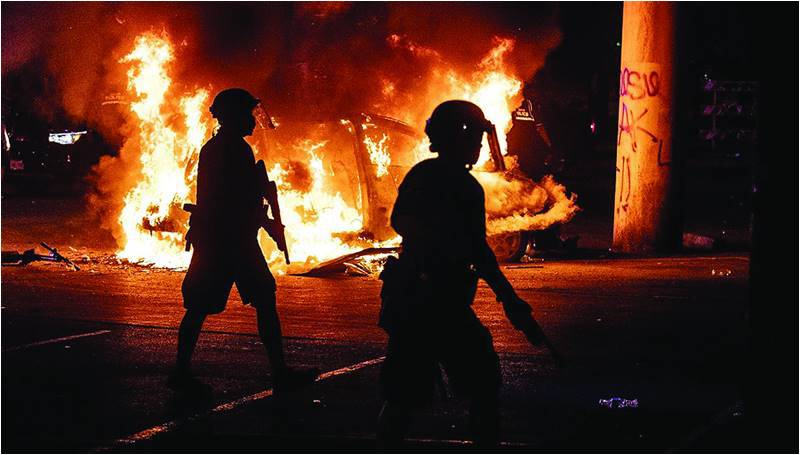
It’s frightening to be in America right now. There is a plague, a dictator in the White House, a crippled economy, a crumbling healthcare apparatus and mass riots against police burtality. It is also true that beneath all of the problems the country faces, one issue remains constant in its corrosive toxicity: America is a fundamentally racist country.
The plague that the country is cowering from is disproportionately killing black and brown folks; the president is inciting race wars with apparent impunity literally the same week he was given a glowing endorsement from the Klu Klux Klan, proving yet again what we all knew, that he would rather see black citizens dead than white police officers face justice. The healthcare system is deliberately cruel, classist, and often designed not to catch those who need it protection most. Many well meaning “woke” people in this country have thus far shown more empathy for looted Louis Vuitton bags than the black men imprisoned or killed with impunity every single day. It has always been frightening to be in America for black people.
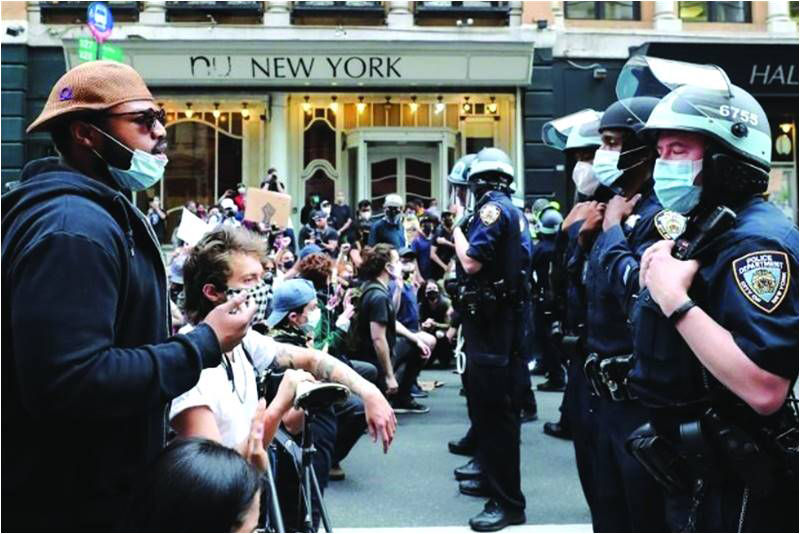
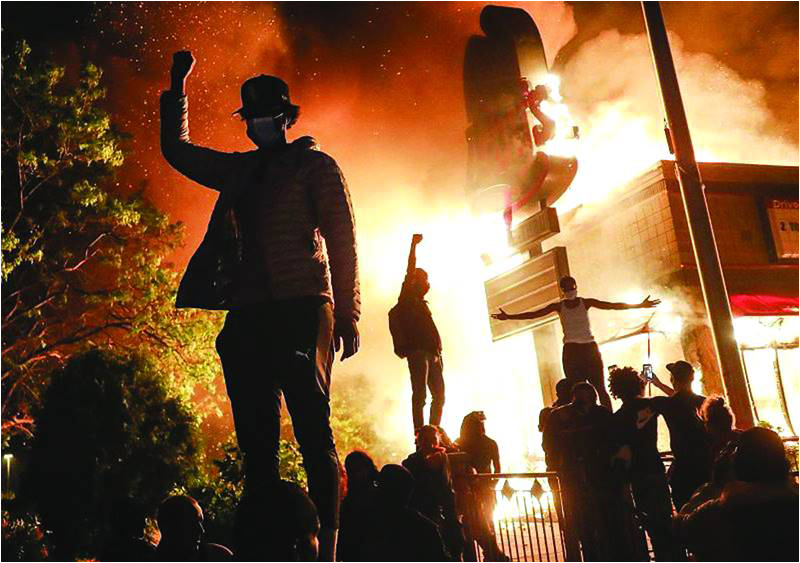
I worked at Amnesty International years ago, which was my first introduction to the scope of police brutality in America. The organization had to choose its battles wisely and at the time they were working with female trans sex workers in NY who would be routinely bullied, arrested and then sent to all-male prisons. Some survived those ordeals, others did not. I was naive enough then to be shocked that anyone had an antagonistic relationship with the police, and lucky enough to have someone explain it to me like this: If I was walking through a dangerous neighbourhood at night and saw the police, I would feel safer. They are here to protect me, I might think, and quicken my pace with confidence. A black person in America cannot assume the police is there to protect them because they are routinely and disproportionately the victims of their aggression and suspicion. Once you let that sink in, much else becomes clearer.
America’s racism is so deep that it is coded into every single thing. Housing inequality, education, employment, real estate, financial and judicial systems, immigration systems, access to resources. Every single thing. Racism isn’t a shark in the water to be shot at and chased away, it is the water. Racism here isn’t always as obvious as a KKK endorsement. It hides and obfuscates in the obvious, like how band-aids are made for lighter skin tones, not darker skin tones. It is in how quickly the presumption of innocence becomes an assumption of guilt the darker your skintone is; it is that the creators of Game of Thrones could imagine a world with three dragons, an army of zombies and a white-haired lizard rider before they could imagine a single black character at all. Anywhere. It is in the fact that black people have to constantly prove they are not violent, or aggressive, or in some ways dupiciotous, where other races do not have to carry that burden.
More people than I can slap have taken it upon themselves to use this time specifically to remind people about things like All Lives Matter. I’ve seen a lot of Pakistanis use it, and some of them probably even think they are well-meaning. To explain why it’s wrong I will speak to them now as if to a child:
Six people are sitting at a dinner table and the food comes out for all of them except, say, Bilal. Bilal isn’t getting a plate or food, so he raises his hand and says out loud “I would like some food, please.”
But the person next to him leans over and says “We would ALL like food Bilal” and digs into his chicken.”But-“ Bilal begins but no-one listens. They all finish their first course. The plates are cleared and the next course arrived, except for Bilal, again.
“I deserve to eat!” says Bilal.
“But we ALL deserve to eat Bilal!” says his neighbour, and digs into his second helping.
The question is not whether all lives matter, because to frame it that way is to deliberately ignore the reality that to nearly all of the most powerful institutions in this country - and this world - black lives do not matter. If you can see a video of a police officer sitting calmly on a man’s neck until he dies, and then still feel the need to remind people that the man was cashing a bad cheque, as if that’s a capital crime, you don’t think that black lives matter either.
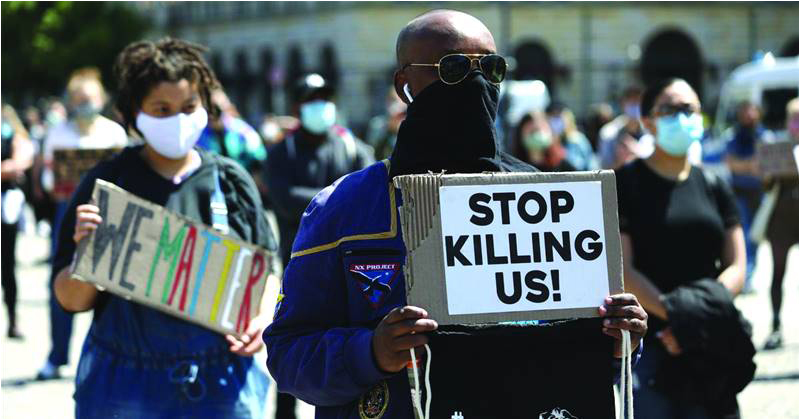
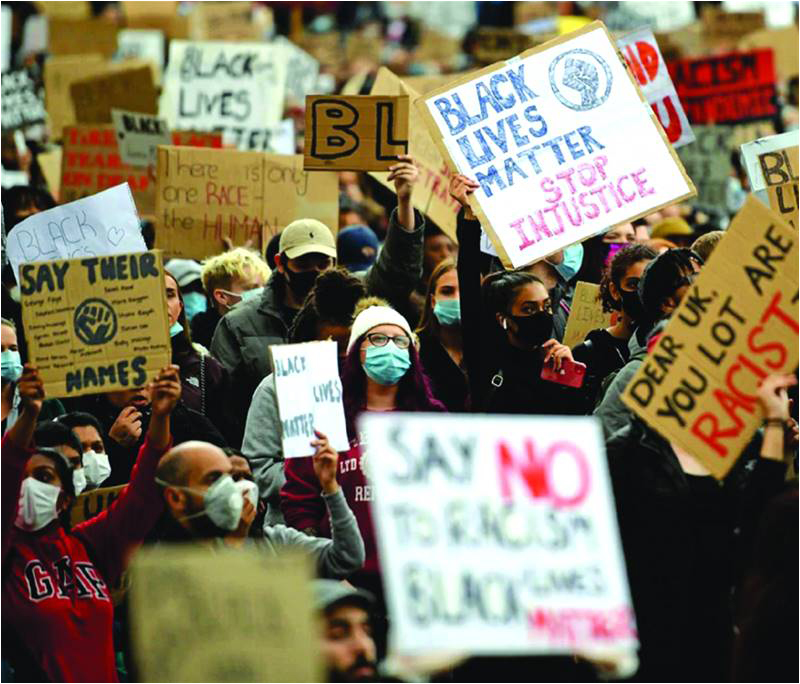
The truth is: racism is not a binary. It’s not something you are or are not. Racism is a spectrum, and our responsibility is to find out not whether we are racist, but how we are, against which kinds of people, and to what degree that manifests in our interactions and decisions.
As I write this I can see NYPD helicopters crisscrossing the skies, smoke coming from five blocks away and feel a constant sense of dread that is as palpable in this city as the air. I’m afraid because we were already battling a virus, but I also know that to demand only the impotent, state-approved versions of “peaceful protest” right now is unconscionable. It prioritized the loss of a strangers’ property over the loss of human life. It would be wise to remind ourselves that Black people have marched for sixty years and not much has changed.
Is it frightening to be in America right now? Yes. It always has been if you’re not white.
Write to thekantawala@Gmail.com
The plague that the country is cowering from is disproportionately killing black and brown folks; the president is inciting race wars with apparent impunity literally the same week he was given a glowing endorsement from the Klu Klux Klan, proving yet again what we all knew, that he would rather see black citizens dead than white police officers face justice. The healthcare system is deliberately cruel, classist, and often designed not to catch those who need it protection most. Many well meaning “woke” people in this country have thus far shown more empathy for looted Louis Vuitton bags than the black men imprisoned or killed with impunity every single day. It has always been frightening to be in America for black people.


I worked at Amnesty International years ago, which was my first introduction to the scope of police brutality in America. The organization had to choose its battles wisely and at the time they were working with female trans sex workers in NY who would be routinely bullied, arrested and then sent to all-male prisons. Some survived those ordeals, others did not. I was naive enough then to be shocked that anyone had an antagonistic relationship with the police, and lucky enough to have someone explain it to me like this: If I was walking through a dangerous neighbourhood at night and saw the police, I would feel safer. They are here to protect me, I might think, and quicken my pace with confidence. A black person in America cannot assume the police is there to protect them because they are routinely and disproportionately the victims of their aggression and suspicion. Once you let that sink in, much else becomes clearer.
America’s racism is so deep that it is coded into every single thing. Housing inequality, education, employment, real estate, financial and judicial systems, immigration systems, access to resources. Every single thing. Racism isn’t a shark in the water to be shot at and chased away, it is the water. Racism here isn’t always as obvious as a KKK endorsement. It hides and obfuscates in the obvious, like how band-aids are made for lighter skin tones, not darker skin tones. It is in how quickly the presumption of innocence becomes an assumption of guilt the darker your skintone is; it is that the creators of Game of Thrones could imagine a world with three dragons, an army of zombies and a white-haired lizard rider before they could imagine a single black character at all. Anywhere. It is in the fact that black people have to constantly prove they are not violent, or aggressive, or in some ways dupiciotous, where other races do not have to carry that burden.
I worked at Amnesty International years ago, which was my first introduction to the scope of police brutality in America
More people than I can slap have taken it upon themselves to use this time specifically to remind people about things like All Lives Matter. I’ve seen a lot of Pakistanis use it, and some of them probably even think they are well-meaning. To explain why it’s wrong I will speak to them now as if to a child:
Six people are sitting at a dinner table and the food comes out for all of them except, say, Bilal. Bilal isn’t getting a plate or food, so he raises his hand and says out loud “I would like some food, please.”
But the person next to him leans over and says “We would ALL like food Bilal” and digs into his chicken.”But-“ Bilal begins but no-one listens. They all finish their first course. The plates are cleared and the next course arrived, except for Bilal, again.
“I deserve to eat!” says Bilal.
“But we ALL deserve to eat Bilal!” says his neighbour, and digs into his second helping.
The question is not whether all lives matter, because to frame it that way is to deliberately ignore the reality that to nearly all of the most powerful institutions in this country - and this world - black lives do not matter. If you can see a video of a police officer sitting calmly on a man’s neck until he dies, and then still feel the need to remind people that the man was cashing a bad cheque, as if that’s a capital crime, you don’t think that black lives matter either.


The question is not whether all lives matter, because to frame it that way is to deliberately ignore the reality that to nearly all of the most powerful institutions in this country - and this world - black lives do not matter
The truth is: racism is not a binary. It’s not something you are or are not. Racism is a spectrum, and our responsibility is to find out not whether we are racist, but how we are, against which kinds of people, and to what degree that manifests in our interactions and decisions.
As I write this I can see NYPD helicopters crisscrossing the skies, smoke coming from five blocks away and feel a constant sense of dread that is as palpable in this city as the air. I’m afraid because we were already battling a virus, but I also know that to demand only the impotent, state-approved versions of “peaceful protest” right now is unconscionable. It prioritized the loss of a strangers’ property over the loss of human life. It would be wise to remind ourselves that Black people have marched for sixty years and not much has changed.
Is it frightening to be in America right now? Yes. It always has been if you’re not white.
Write to thekantawala@Gmail.com

